- Home
- Robert McCammon
The Hunter from the Woods Page 6
The Hunter from the Woods Read online
Page 6
Chapter 6
When he received no reply from either Beauchene or Michael, Manson Konnig turned away and left the mess hall as nonchalantly as if he had just eaten a four-course meal and was on his way to take a nap.
They went after him.
Up on the deck, the crewmen who had guns were training their weapons on him. He strode to the port gunwale, where the rope ladder was still hanging over the side. The rain had lessened, the sea flat except for broad-backed rollers, visibility still closed-in. Konnig waved to the motor launch, which had kept pace with Sofia. It nosed in at the bottom of the ladder.
The captain of the Javelin started over the gunwale. He looked up as Beauchene approached, the pistol and Tommy gun ready to blow him to pieces. Rain streamed from the Frenchman's face and hair and his mouth was a grim gray line.
Konnig hesitated. "Sir!" he called to Michael, who was just behind Beauchene. "Restrain your captain, if you will. There is yet time for a peaceful conclusion to this. And your freighter would make such a lovely fire. "
Beauchene didn't stop. He came across the deck like a juggernaut. He reached Konnig and put the Thompson's barrel under the man's chin.
"Surely," Konnig said, with a half-smile, "you wouldn't sacrifice your entire crew for a single nigger?"
Michael saw Beauchene's trigger finger twitch.
But the Thompson remained silent.
Konnig stared into the Frenchman's eyes for a few seconds, and then - satisfied with what he saw there - he pulled his throat away from the submachine gun and began his climb down the rungs.
The motor launch received him and he stepped under the shelter of its canopy. The boat turned to port and moved off through the shifting curtains of gloom.
Beauchene stood alone, as Sofia rocked him.
He abruptly turned away and walked quickly past Michael, who followed him because he knew where the captain was going.
In the mess hall, Beauchene approached the African's body. Blood had trickled like a pattern of scarlet lace from the bullet hole. Kpanga's eyes were open, his forehead misshapen. Beauchene set the revolver and submachine gun on a table and bent down to pick up Kpanga's glasses. As he stood over the body, he wiped the lenses on his dirty once-white shirt.
Michael picked up the pistol and slid it back into his waistband. He said nothing; words were no good in this room.
Beauchene knelt, opened the African's coat and put the glasses in the inside pocket. He remained kneeling for a moment, with his head bent forward. His eyes didn't know where to rest. He made a noise like a gasp, and that was all.
He stood up.
"I'll have to find somebody to say something," he told Michael. "I didn't know him. " He went to the door and paused. "We've got to get ready. You coming?"
Michael nodded. "I am. "
They left the mess hall and the dead African on the floor and went back to the deck where the crew was waiting to be told.
Ten
Bucket Of Blood
By late afternoon the Wesshausers had been placed in a single stateroom with mattresses padding the walls. They tried to make a joke of it, something to do with a padded cell, but they knew exactly what was coming.
The crew had been fed steaks as tough as boot leather and energized with hot black coffee. Those who wanted or needed Benzedrine tablets got them from the doctor. The rest of the mattresses from the crews' bunks were roped to the gunwales and allowed to hang down nearly to the waterline; it was thin insurance against the five-inch shells, but might prevent a hull breach. Crewmen stood watch along the deck and from the crow's nests atop both masts. The rain fell intermittently, the sea foamed and swirled, and Sofia kept on her full-speed course to the land of Shakespeare. The Javelin made no appearance from the North Sea mists.
Michael Gallatin was standing near the bow, searching those mists with a pair of binoculars, when he heard her approaching. She stopped on the other side of a lifeboat that had unfortunately been punctured by fifteen slugs from Javelin's machine gun.
"You shouldn't be on deck," he said, lowering his glasses.
"I needed to walk. "
"Keep walking, then. And get below as soon as you're done. "
"You sound like you think you're my father. "
"I'm amazed your father would let you out here. Don't you know what's likely to be happening any minute now?"
Marielle peered warily around the splintered lifeboat. She was wearing her buttoned-up overcoat with the collar upraised. Her blonde hair spilled out below a wine-red beret. She had her hands thrust into her pockets; though Sofia was rolling, Marielle had found her sea-legs.
"I know," she said, and she let her eyes graze past him. "My father knows, too. He appreciates the effort, but he thinks we'll be on our way to Germany before nightfall. "
"Not if I can help it. " He brought the binoculars back up and kept searching.
"My father doesn't think anyone can help it," she replied. "They've found us and they're going to take us, and that's that. "
Michael grunted. "I wouldn't have thought your father was a quitter. Or you either, for that matter. "
"It's not quitting. It's being accepting of reality. That's what my father says. "
"Whose reality? Hitler's?" Michael let the question hang. He lowered the glasses again and turned his head so he could look directly into her aquamarine eyes. She pulled back just a little, but not by much. "Your father's been very brave so far. He must be a brave man, to have risked his family. To have risked everything, really. Well, I'm not giving up and neither is the captain and crew of this ship. So why should he?"
"He doesn't want anyone else to be hurt. "
"Someone's going to be hurt, whether they take you off this ship or not. It's the Nazi way. " He gave her a brief tight smile.
She studied him for a moment with a number of sidelong glances. "There's something strange about you," she decided. And amended the word: "Different, I mean. "
"Possibly so. " He wondered if she could sense the animal in his soul cage.
She stared out upon the sea. "I think," she said, "you're a gentleman pretending to be a roughneck. "
"That's interesting. " Again he scanned the mists with his glasses. "I've always thought of myself as a roughneck pretending to be a gentleman. "
"You're hiding something," she said.
"Who isn't?"
"What you're hiding. . . isn't like anyone else. It's. . . " Marielle frowned. "Very deep," she finished.
"Not so very deep," Michael said, but he didn't wish to say anything more.
She was silent for awhile. Michael suddenly wished she would go away, because he thought she could see more than she realized.
"Do you think I'm crippled?" she suddenly asked. "Is that why you told me the story about Vulcan? Because he was crippled, too?"
"I told you the story about Vulcan because I could see him working at his forge in the sky. "
"No," she said, and abruptly she took a lurching step forward on her high shoe and the sixteen-year-old girl regarded him with the calm and knowing composure of a woman. "Herr Gallatin, I don't ask anyone to feel sorry for me. I don't want that, and I never have. I don't really like being as I am. I don't like the sound I make as I walk. I don't like the attention it draws, because it's always people feeling sorry for me. Either that, or laughing at me behind my back. But I can abide that, better than the other. I can't stand looking into the faces of people and seeing what they're thinking of me, that I'm a poor pitiful child who wears a heavy shoe and can never walk right and can never dance. But I never ask anyone to feel sorry for me, Herr Gallatin. And I saw that in your face the first time I looked at you. I see that in many faces aboard this ship. So, yes, I may be crippled and I may not wish to be around people very much, for just the reasons I've said, but. . . "
And here she hesitated, as if to draw up from her depths what she really had to say.
&nbs
p; "Please," she said, and in her eyes there gleamed the bright shine of tears, "do not cripple my dignity. "
He faced her directly. "I would never dream of such a thing," he said. "I told you about Vulcan not because he was crippled, but because he knew pain. I think you know pain, Marielle. I think that's what you hide, very deep. And I think you have to find a way to let it go, so you can forge a life. "
Her eyes were glassy. Her mouth twisted a bit. "What do you know of it?" she asked, in a bitter whisper.
How to answer such a question? he wondered. He realized she couldn't see herself. She couldn't see her potential for beauty, or for joy. She couldn't see how lovely her eyes were, or how soft was her hair. She couldn't see the German roses in her cheeks, or her own svelte slim body beneath the shapeless overcoat. She could only see the malformed leg and the heavy shoe that weighted her like an anchor to the earth. And of all the faces that held pity for her, no one held more pity than the face in the mirror.
A lookout shouted from the aft crow's nest. Another shout replied, over on the starboard side.
The Javelin was coming. Michael had expected it from the port side. Even though he couldn't see the warship, he realized from the crew's warning shouts that it had crossed their stern and was probably even now swinging its guns toward the target.
Billy Bowers stood within calling distance. Michael said, "Billy! Come here! Get the girl below!"
Billy hurried over and, though Marielle recoiled in abject fear, he took her hand. "I won't bite you!" he said. She resisted him and jerked free. She tried to stagger away, but she lost her balance and fell against the gunwale. "Damn it, girl! Hold still!" Billy told her, and then he scooped her up in his arms and nearly ran with her across the deck.
Michael strode to the starboard side. And there through the glistening mist, just barely visible, was the deadly silhouette of Manson Konnig's Javelin.
It was too distant for any bullet from Sofia to reach. Michael saw flame gout from the forward cannon and heard the blast, and he realized with a sinking heart that in a few moments Sofia might well be reduced to a bucket of blood.
Water shot up just short of the hull. The crewmen with rifles were firing, as if it would do any good. The next shell from Javelin sizzled over the deck and spewed up water on the port side. Getting the range, Michael thought. Where the hell was Beauchene? As if he could do any good, either!
Michael cursed Valentine Vivian. One thing was certain: a wolf could drown as easily as a man.
The third shell hit Sofia amidships, just above the waterline. The shock may have been cushioned by a mattress, but who could say? A vibration rippled across the deck. Another shell cut a gash across the forward mast. And then both of Javelin's guns began firing in rapid succession, and in a matter of seconds the shrieking projectiles slammed one after the other into Sofia's hull, her deck and her superstructure.
The freighter heeled to port. Michael lost his footing and was thrown back against a capstan. He went down to his knees, and there felt what must have been another shell rush past him with a high-pitched whine and a smell of burned matches. Behind him, a lifeboat exploded into kindling. Something crashed against metal and screamed off into the air. He heard shells hitting like punches being thrown against human flesh. A figure stumbled past him, holding the bleeding stump of a right arm. Sofia pitched back and forth under the barrage, and when Michael looked toward the wheelhouse he saw holes being torn in the superstructure as if it were made of flimsy cardboard. More portholes exploded. The ship shuddered along her length, and still the shells continued to strike.
A lycanthrope could know horror. He knew it, when he saw the glass windshield of the wheelhouse blow inward from a direct hit.
Over the ear-blasting noise of shellfire and the rending of steel he heard a man screaming and did not know if it was his own voice or the voice of a comrade.
He knew only that the ship's wheel was most likely unmanned, or in the best case helmed by a Swede whose eyes had been cut to pieces by flying glass.
He got up off his knees and ran across the deck, which shivered like the spine of a kicked dog. He reached the staircase and climbed up, and as he climbed he saw the red flames spouting from Javelin's guns and Sofia being torn apart below him.
On the bridge, the Russian radioman was fighting for control of the wheel. The Swede lay with a blood mask for a face and his throat sliced open. Medina had collapsed in his own pool of gore next to the engine order telegraph. Overhead, cables dangled down and electric sparks jumped. A fresh insult of rain swept through the opening where the windshield had been. Sofia, gone mad with pain, was turning herself starboard toward Javelin as if to end her agonies.
"I've got it!" Michael shouted, and he grasped the spokes of the glass-slashed wheel and wrenched it to port. How long did it take for the rudder to respond? Sofia went on, heedless of human hands. He thought the rudder must have been blasted away. Under his feet, the bloody planks jumped from the percussion of more shell hits. A hot sizzling thing, smoking like a comet, burst up from Sofia's deck into the air.
Michael felt the rudder bite hold and the freighter begin to turn. He put his back into the wheel. The Russian radioman retreated to give him space. Fire suddenly rippled along the torn electrical cables above Michael's head. Still the ship was turning, responding by slow inches. Waterspouts shot up on either side of Sofia and then through the rain that flew into his eyes Michael saw ahead of them a white mass that hid the sea.
A fogbank, he realized. He glanced at the engine telegraph. The pointer was set to All Ahead Flank, the fastest possible speed order. Medina must have rung it before the wheelhouse was hit. The bow was headed right into the fog. So be it, Michael thought.
And then: Go, you bitch!
Someone shoved him aside.
Gustave Beauchene, blood streaming from a wound on his forehead and his shirt and yellow rainslicker streaked with it, took charge of the wheel. He, too, had seen the fogbank. Shells crashed into Sofia's stern. The thunder of cannonfire echoed across the sea. Michael smelled blood and gunpowder and the sweat of fear. "Get to the stern!" Beauchene shouted to the Russian. "Find whoever you can and start throwing the ropes and nets in our wake! Go, now!"
The Russian ran out and down the stairway. Michael realized Beauchene was desperately hoping something might foul Javelin's props, because the warship was going to be right behind them.
Trembling, Sofia entered the fog.
It closed around the freighter like a huge cloud. In a matter of seconds, tendrils of fog drifted across the deck and visibility was cut to maybe twenty meters. The sound of the diesels pulsed against the white thickness. "Allez, allez!" Beauchene whispered, as blood ran down through the seams of his face to his chin.
In another moment he turned the wheel a few degrees to port. Then again to starboard. White fog swirled into the wheelhouse, the breath of ghosts. Michael went into Beauchene's cabin and found a nasty oil-stained rag; he brought it out and gave it to the captain, who silently pressed it against the wound on his forehead.
Beauchene turned the wheel to port once more. He said, "Hold her steady," and Michael took the helm. Beauchene rang up a change on the telegraph: All Stop.
The voices of the big diesels faded to a low rumble.
Then. . . there was only the hiss of the fog and the sea, the pained creaks of Sofia's injured flesh and bones, and the noise of men calling to each other in the gloom.
Sofia drifted.
Beauchene fetched a fire extinguisher from the radio room and sprayed out the overhead flames. His bloody face stared impassively at Michael Gallatin.
His voice was a dry croak. "I'm going to go find out the damage. If we're sinking or not. I'm going to go find out how many men have just died. And your people may be dead, too. That may be for the best, for them. We can't take another beating like that, do you understand?"
Michael answered, "I understand. "
"She's been hurt," said Beauchene, as if that explained everything.
Then the Sofia's master, suddenly a very small and weary man, turned away and stumbled down the stairs where his bloody handprints stained the rail.
Eleven
The Specialist
Twelve men wounded, four severely. Five men dead, including the doctor when the infirmary was hit by two shells one nearly after the other. The pumps working at full capacity to fight the gushing leak near the stern until a patch could be welded in. Some electrical damage forward. Many new hull, deck and superstructure scars, though nothing critical. Damage to one of the engines due to running at flank speed, but thankfully the engineers vowed to repair it within six hours.
Darkness fell. The fog remained. All of Sofia's lights were cut except for a few bulbs belowdecks. Shadows began to claim the ship.
"Not very fucking good," was Beauchene's report to the remainder of the crew in the mess hall. A bandage was plastered to his forehead, his eyes puffed with pain. "We're alive and afloat, but when this fog clears we're dead, plain and simple. We've got three lifeboats left. I'm telling you that anyone who wants to strike out on their own can go. You can take some food and water. If you're going, dress warm and get out now. Maybe you'll be picked up by another freighter and you'll live to tell the tale. All right, then. God be with you. "
The three lifeboats stayed where they were.
The night moved on.
Crewmen stood watch in their fields of fog. They listened for the throb of engine noise, but if Javelin was out there she was gliding.
They had no doubt Javelin was out there.
Beauchene did have a plan, of sorts. Every so often he ordered the engine room to provide enough power to creep forward a few hundred meters, then Sofia was allowed to drift again. The intent was to keep the noise down, keep the bow aimed toward England, and maybe - maybe - get out on the other side of this fogbank before Javelin could find them. In the meantime, the radio jamming continued and no messages could get through.
Around midnight, as some of the crew came to fill their cups from the bottomless coffee pot, Michael sat at a table with Olaf Thorgrimsen and Billy Bowers. The cook had supplied some raspberry pie which actually tasted of raspberries, showing that pressure was good for the kitchen. Currents of cigarette smoke moved slowly in the air, and all conversation was hushed.
A gaunt, pallid man who entered the mess hall immediately became the center of attention.
Paul Wesshauser, in his black trousers and gray sweater, poured himself a cup of coffee. His eyes were dark-hollowed beneath his glasses. He looked like a man bearing a heavy burden. He sat down at a table by himself, spooned a half-cup of sugar into his joe, lit a cigarette and inhaled to the roots of his lungs.
Michael left his own table and walked the few paces to Wesshauser's. "Do you mind if I sit with you?"
Wesshauser shrugged, and Michael sat down.
"You holding up?" Michael asked; it was a stupid question, from the look of the man.
"I'm all right. " Wesshauser drew the smoke in again and let it slowly seep from his mouth. "How many died for me today?"
"Five. "
"Five," Wesshauser repeated. He examined the burning end of his cigarette. "My God. I never meant for this to happen. "
"Of course not. And you're not to blame for the deaths. "
"Yes, I am. " Wesshauser's eyes flashed. "If I hadn't taken it in mind to leave Germany, then. . . everything would be as it was. "
"That's right," Michael agreed. He took a sip of his own black coffee. "You'd still be in Germany, and you'd be working for the Nazis. A fine future that would be. Making weapons for them? You do make weapons, correct?" Michael hadn't been told exactly what Wesshauser's area of expertise was.
"I'm a designer," said the man.
"You make that sound very elegant. " Michael watched the smoke drift from Wesshauser's mouth. "I think you did the right thing. The only thing. If you feel the Nazis would misuse what you design then you had no choice but to get out. And it took a lot of courage to get this far. "
"Yes, I should be proud of myself for killing so many men, and for ultimately killing my wife, daughter and son. " Wesshauser smiled without humor. "Because that's what I've done. " He bit down on the cigarette. "I went to see Captain Beauchene. To ask him to give us up. Do you know what he told me?"
"No, what?"
"He said he would not allow his crew to be killed like sheep. He said they would die as men, and that those who had already sacrificed their lives would not be dishonored. So, he said. . . no, he would not give us up. I stood before him and begged. And he told me to get out while I could still walk. "
"Good advice," Michael said. He knew what part of it was: Gustave Beauchene the garbageman versus Manson Konnig the aristocrat. Michael found himself staring at the place on the floor where Enam Kpanga had died. A mop had soaked up the blood and the canvas-shrouded body had been consigned to the sea. "My daughter told me you've spoken with her. " Wesshauser adjusted his glasses as if to view Michael from a different angle. "That story about Vulcan. She found that very interesting. You know, she keeps to herself quite a bit. "
"Does she?"
"Oh, yes. It's the leg, of course. And the shoe. She's terribly shy about it. She doesn't wish to stand out in that way. Her mother and I. . . we do our best to keep her from feeling so bad about herself, but. . . you know. . . she is crippled. "
"Hm," Michael said.
"It's difficult," Wesshauser went on, "to hold such standards of perfection and have a daughter who. . . is afflicted. My own father was a perfectionist. He was the great shining example of the German engineer. Everything should fit together just so. And I have led my life the same way. So. . . it's difficult. . . when - "
"Everything doesn't fit together just so?" Michael interrupted.
"Yes. Difficult," said Wesshauser. "And difficult for Marielle also. "
"I'm sure. " Michael finished off his coffee. He was ready to rejoin Olaf and Billy.
"But my high standards have suited me well," Wesshauser told him. He drew deeply again from his cigarette. "That's why they want to stop me from getting to England. I know what's coming, very soon. They don't want the British Navy to have access to my knowledge of torpedoes. "
"Hm," Michael said once more, for want of a better comment. He thought this man was probably a self-important prick. He pushed his chair back and stood up. "Thank you for your time," he said, with a chill in it. He took his empty coffee cup back to the big stainless steel dispenser to fill it up again.
But before he got there the words my knowledge of torpedoes hit him. He stopped abruptly, with an idea lodged in his mind. A man behind him - one of the engineers - bumped into him and went around.
"Wesshauser," Michael said when he returned to the man's table. The eyeglasses peered up at him from behind the pall of smoke. "Could you. . . make a torpedo?"
"Make a torpedo," Wesshauser repeated, without inflection.
"That's right. You're the specialist. Could you make one? Put it together from. . . well. . . whatever's on this ship. "
"I have no idea what's on this ship. It goes without saying that I'd need high explosives. There would have to be a steel casing and a detonator. " He frowned and dropped the cigarette butt into his cup. "What are you carrying?"
"Machine parts, ball bearings, hardwood logs and fertilizer. "
"Fertilizer," Wesshauser said.
"That's right. About three hundred oil drums full. Just common stuff, I understand. "
"Made with ammonium nitrate?"
"I don't know. "
"And of course you have diesel fuel?"
"Yes. "
Wesshauser nodded. His eyes looked shiny. "Do you realize that amount of ammonium nitrate could detonate and blow this ship into outer space? And that combined with diesel fuel, the explosive compound is made certain to blow?"
Michael swallowed. "I. . . suppose. . . you're saying - "
"I'm saying if the fertilizer is made with ammonium nitrate, you are carrying many hundreds of high explosive devices on this freighter. My God! Are you people insane? What are your conditions to prevent oxidation in the hold?"
"There are fans," Michael said lamely. "When they're turned on. "
Wesshauser stood up. "Listen to me!" His voice was urgent, because he'd realized that here might be - might be - a way out. "Do you have a machine shop? A welding station?"
"Yes. Both. "
"No shortage of steel. " Wesshauser was talking to himself. Then, to Michael: "Machine parts, did you say? Of what nature?"
"You'd have to ask the captain. Even he might not know. "
"All right, all right. " Wesshauser ran his fingers across his mouth. "Let's say a watertight casing can be made and the machine parts would be suitable to form a detonator. Wait. . . wait!" He shook his head. "No. Ridiculous! There's no possible way to deliver the weapon. No torpedo tube, no way of aiming the thing. " His hand crept up and his forefinger beat against a vein at his right temple as if to wake up a sleeping part of his brain. "Mathematics," he said. "There's so much mathematics involved in aiming and delivering a torpedo. And even so. . . the odds are that the weapon will not hit its target. This ship. . . there's no possible way to send a torpedo from this ship to strike the Javelin. I could make a dozen torpedoes, if I had the time and materials, but without a delivery device - "
Wesshauser stopped speaking. He blinked suddenly, as if startled by a flash.

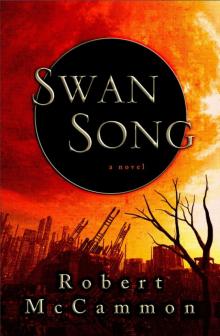 Swan Song
Swan Song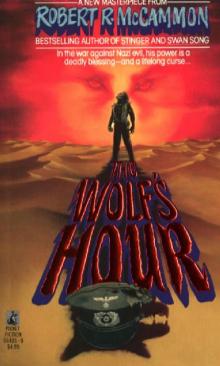 The Wolfs Hour
The Wolfs Hour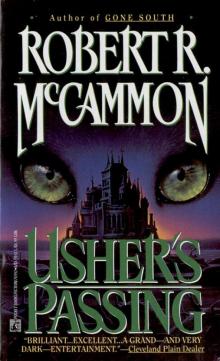 Ushers Passing
Ushers Passing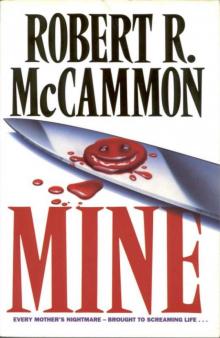 Mine
Mine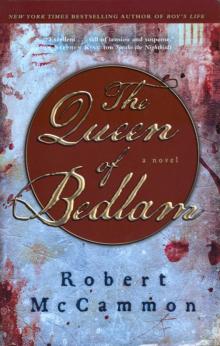 The Queen of Bedlam
The Queen of Bedlam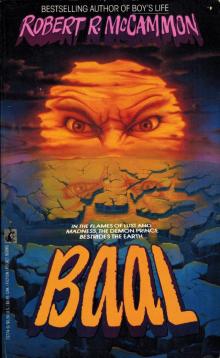 Baal
Baal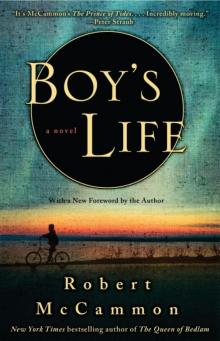 Boys Life
Boys Life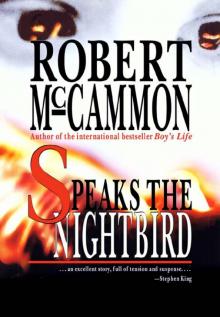 Speaks the Nightbird
Speaks the Nightbird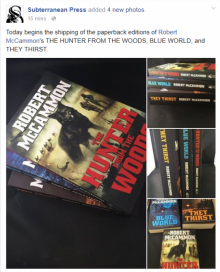 The Hunter from the Woods
The Hunter from the Woods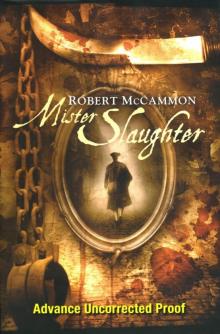 Mister Slaughter
Mister Slaughter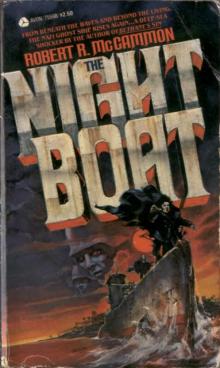 The Night Boat
The Night Boat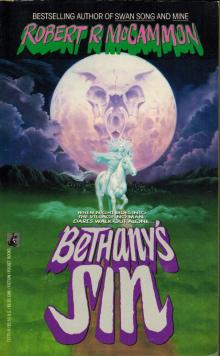 Bethanys Sin
Bethanys Sin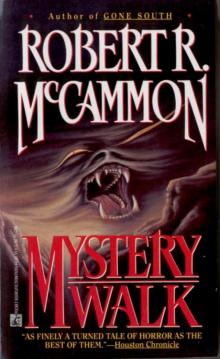 Mystery Walk
Mystery Walk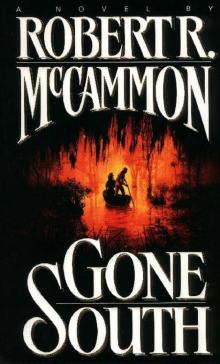 Gone South
Gone South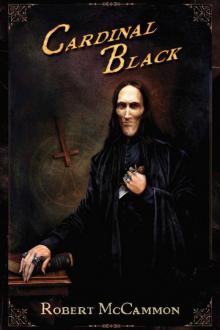 Cardinal Black
Cardinal Black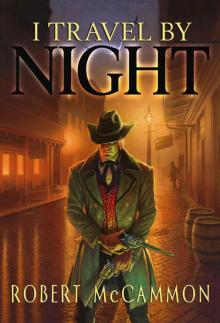 I Travel by Night
I Travel by Night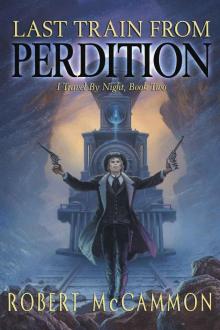 Last Train from Perdition
Last Train from Perdition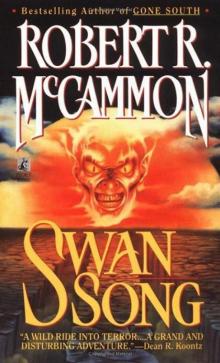 1987 - Swan Song v4
1987 - Swan Song v4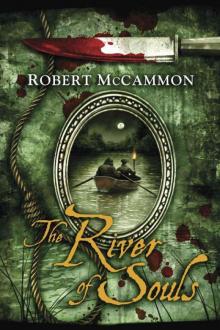 The River of Souls
The River of Souls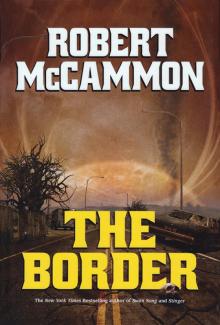 The Border
The Border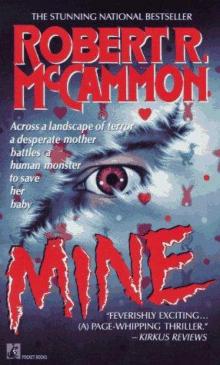 1990 - Mine v4
1990 - Mine v4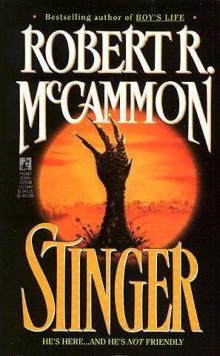 1988 - Stinger
1988 - Stinger The Listener
The Listener